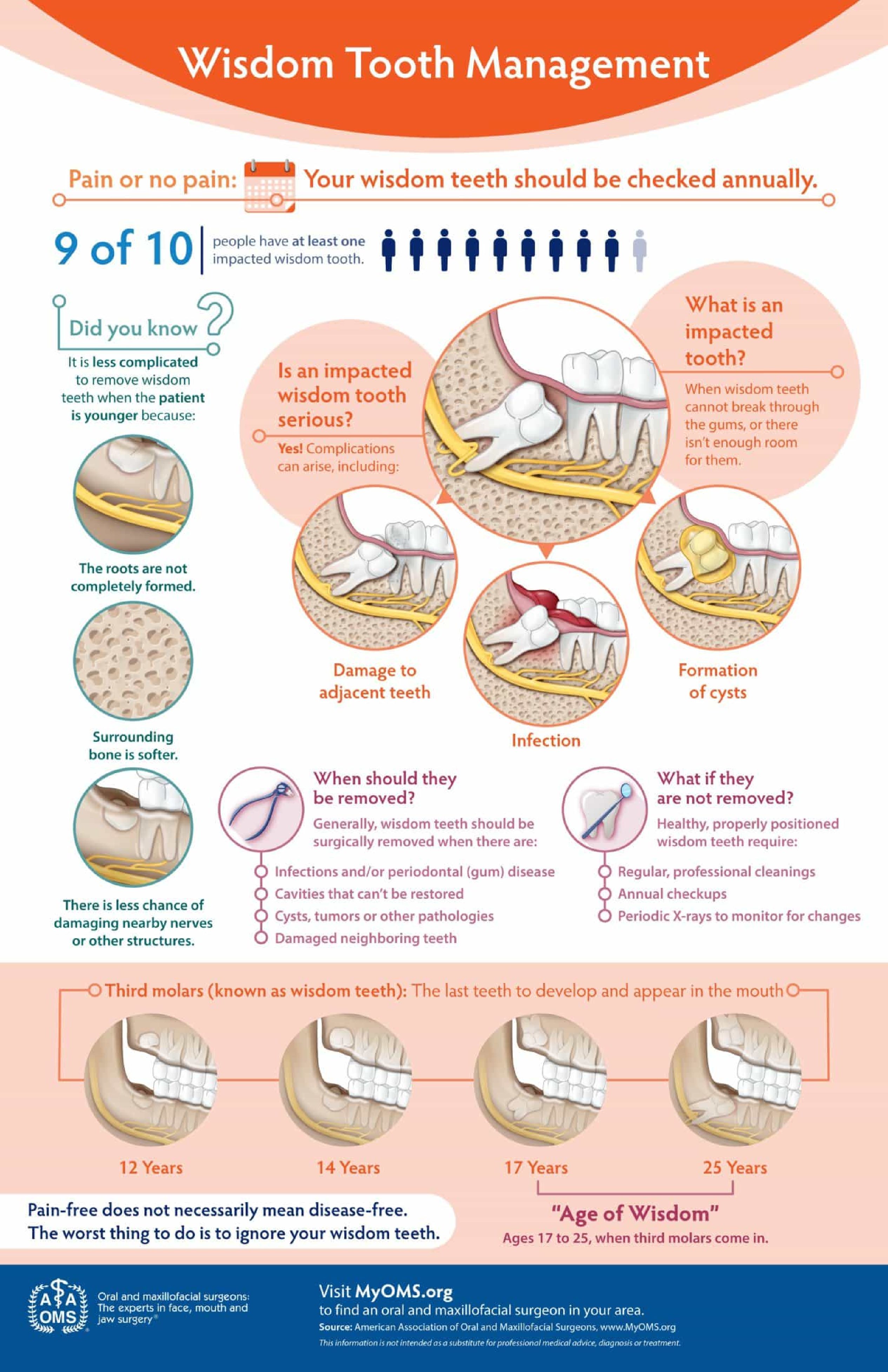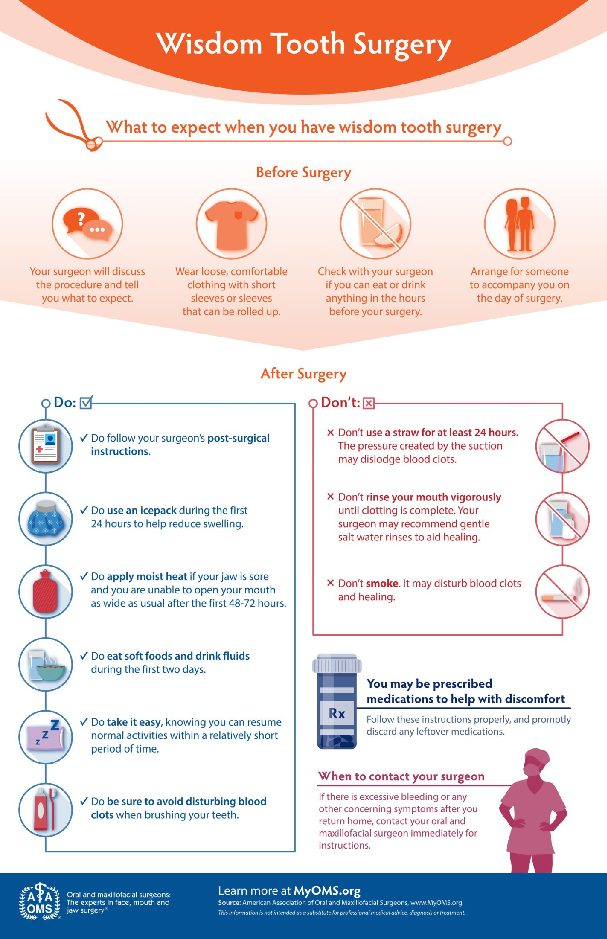The human body does a lot of amazing things, it also has a lot of mysteries as well like wisdom teeth. This extra set of molars that emerge sometime in your teens or early adulthood for some people and not at all for others can range from going completely unnoticed to causing a whole host of other dental problems.
Since there is so much variation between people’s experiences with wisdom teeth, it can be a source of anxiety trying to figure out what to expect. Especially when you’re going into a wisdom teeth removal procedure.
We’re here to ease any anxiety you may be having by explaining everything there is to know about wisdom teeth removal surgery so you can be as prepared as possible for the experience!
Candidates for Wisdom Teeth Removal
The first thing to consider is if you even need a wisdom teeth removal procedure because not everyone who has wisdom teeth does. Sometimes they can be left alone and you can live with them perfectly fine!
But you’ll know you need them out when you’re experiencing regular pain around where they are coming in. That can be in the jaw or gums and can present itself with swelling or redness. Some patients don’t necessarily experience extreme pain but instead a constant discomfort that interrupts their daily activities.
Wisdom teeth that are disrupting your other teeth, bite, or jaw will need to come out as soon as possible!
Procedure Preparation
Luckily, there isn’t a lot that you’ll need to do to prepare for wisdom teeth removal surgery. These procedures are generally straightforward and simple, so the main thing is making it to your consultation appointments for your x-rays so the surgeon can make a clear plan for removal.
Beyond that, making sure you have a plan in place for after the procedure is the most important step.
That includes someone to drive you home from the office, foods that are safe to eat, and other help you may need for your specific situation. Having all of these things set up beforehand will make your recovery much smoother overall.
Wisdom Teeth Removal Procedure
Every wisdom teeth removal surgery is slightly different because they don’t all grow in the same way. But, generally speaking, most removal surgeries follow the same pattern.
First, the patient will be sedated to a certain degree based on the intensity of the surgery. Next, the surgeon will remove any teeth that have already come through the gums and are easily reached. After that, they’ll begin to carefully remove the gums to expose those teeth that are still hidden beneath.
This can be the tricky and more complicated part as wisdom teeth can be impacted in hard-to-reach areas of the jaw. Sometimes, teeth have to be removed in parts because of the positioning. Once it’s all out the surgeon will then stitch up the area and you’re all done!
Sedation Levels
A big factor in how the surgery and the recovery go is how much sedation is necessary, which all depends on how the wisdom teeth have grown in.
When the teeth are all the way in with little issues, a patient can likely just have local anesthetic numbing. Others will need more to help with the anxiety to keep them still and calm throughout the procedure. Some patients prefer to be put all the way to sleep as well. You can work with your surgeon to find the best fit for you.
Potential Side Effects
Even though this is a common procedure and you’ll get to go back home in just a few short hours, it’s still a surgery and there are going to be some side effects to watch out for. It’s a good idea to know what to expect so you can prepare for it as best you can.
The most common side effect is facial swelling and normally lasts a few days. If it lasts longer than that, you should call your doctor immediately. Most patients also experience some pain, discomfort, and even bleeding for a little bit. It shouldn’t be excessive and should be easily controlled.
It’s important to monitor all of your side effects and stay in contact with your doctor if anything seems out of the ordinary.
Healing Time
While there’s no definitive timeline for healing after a wisdom teeth removal surgery, it generally takes no more than a week to feel completely back to normal.
Most patients can bounce back from these surgeries quickly and resume their regular actives (besides changing their diets for a few days) almost immediately). And the relief from the issues the extra teeth were causing is just as immediate as well!
Life Without Wisdom Teeth
Once you’ve completely recovered from your wisdom teeth removal surgery and the stitches have dissolved, your life will go right back to normal. There will be no lasting difference without those excess teeth.
The amazing thing about wisdom teeth is that they play no crucial role in our mouth’s function, so we can live without them with no problem. In fact, in most cases, our jaws are much healthier without them. There is much less potential for issues once they are removed and most patients are better off without them!
Expectations for Wisdom Teeth Removal Surgery
While not necessary for every set of wisdom teeth, for many patients wisdom teeth removal surgery makes all the difference in feeling comfortable and easing pain. After the extra teeth are gone they can get back to eating normally and don’t have to worry about gum or jaw pain interrupting their daily activities.
It’s worth the few days of discomfort to have the relief and to take away the potential problems that could come from having those extra teeth in the way. The best way to know if you’re a good candidate for this procedure is to talk with your dentist!
If you’re in need of any kind of dental surgery we can help you with that, contact us today to set up a consultation!



